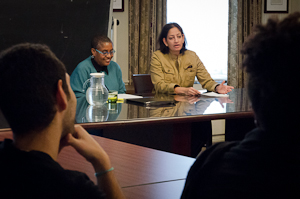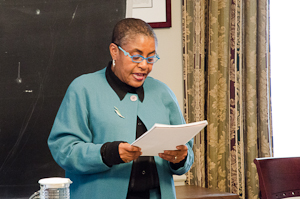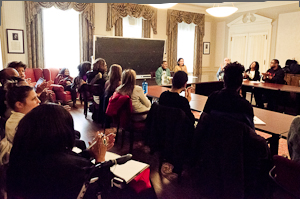The Faculty’s first O’Brien Fellow in Residence, Professor Esmeralda Thornhill, speaks on ‘Race Literacy’ for the legal profession.

There was an atmosphere of boisterous anticipation in the Faculty’s Stephen Scott Seminar Room on November 9, as Professor Esmeralda Thornhill spoke about “’Race’ Literacy and the Legal Profession: An Ethical Imperative for Cap, Bar, and Bench.”
Hailing from Schulich Law School at Dalhousie University, Professor Thornhill is the first O’Brien Fellow in Residence at the McGill Centre for Human Rights and Legal Pluralism (CHRLP).
The O’Brien Fellows in Residence program aims to provide opportunities for academics and human rights practitioners to bring in new approaches and a broader understanding of pivotal issues during their stay.
Said Thornhill in her opening remarks, “I commend the CHRLP for its vision and insight in creating such a significant discursive space within the Academy, geared to promoting interdisciplinary human rights scholarship that both reflects theory and, more importantly, validates praxis and field experience.”
While in residence from October 13 to November 22, Thornhill shared with the Faculty some of her findings related to ‘race,’ racism, human rights, law and immigration in Canada.

In a lunch-time lecture presented by the Annie MacDonald Langstaff Workshop Series, in association with the CHRLP and the Black Law Students’ Association of McGill (BLSAM), Thornhill called for an increased ‘Race’ literacy training in the legal profession, a concept which she defined as “the capacity to understand the powerful and complex ways in which the notion of ‘race’ both influences social, economic, political and educational experiences and textures the lives of our prospective clients, colleagues and interlocutors who are racialized.”
According to Thornhill, tropes of race, racism and racial inequality embedded within Canadian law and legal culture are not yet satisfactorily addressed at law. “The profession has a training vacuum,” she affirms. “In the cold light of day, can a freshly minted or a seasoned lawyer attest to having gone through a rigorous legal training whose core curriculum has fire-drilled him/her on the ‘durable, hard grammar’ of ‘race’ and racism, their societal dynamics and interaction with the law? How mindful are our law faculties and bar societies of their ethical obligation to equip members to ensure the best possible defense that realistically meets the legitimate expectations of racialized clients?”
Thornhill’s thought-provoking presentation triggered an open discussion among the more than 40 students, professors, lawyers, and other legal professionals present in the filled-to-capacity room.

“One issue that resonated with me,” said Sandra Aigbinode, law student and BLSAM’s VP External, “was Professor Thornhill’s statement that ‘race must be named.’ We believe that racism is not a Canadian problem. But she pointed out how, by not mentioning the word ‘race’ or ‘racism,’ we avoid confronting the issue and that, ironically, by using euphemisms such as ‘diversity,’ we continue to perpetuate racial disadvantage and inequity.”
Professor Esmeralda Thornhill has researched, written, and lectured widely on the “material reality” of racism in law, education, and public services. At Dalhousie, she teaches, notably, Critical Race and Legal Theory, and international and domestic Human Rights Law. She pioneered the first Canadian university accredited course in Black Women’s Studies (Concordia). A Canada-US Fullbright Visiting Scholar (Temple), she was the first holder of the James Robinson Johnston Endowed Chair in Black Canadian Studies, a national initiative “to bring Black culture, reality, perspectives, experiences and concerns into the Academy.”
-B.W.
